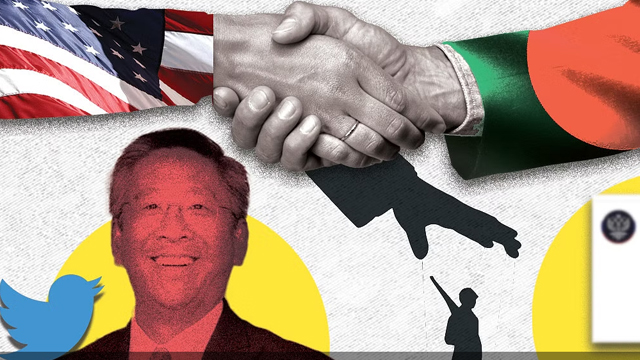Lu’s visit: Old message, only louder (Ali Riaz)

US Assistant Secretary for South and Central Asia Donald Lu’s two-day visit to Dhaka has drawn significant attention in the media in Bangladesh, which continues to reverberate even after the visit is done with. What message did Lu bring? And has the government of Bangladesh succeeded in making its points?
Although it was Secretary Lu’s second visit to the country, discussions surrounding the visit spilled over to politics, transcending the usual diplomatic circles.
When Secretary Lu visited Bangladesh in March last year, as a part of the US delegation to attend the partnership dialogue, he wasn’t featured much in the media. The Under-Secretary for Political Affairs, Victoria Nuland, led the team. In the formal sense, the agenda for Lu’s visit was nothing different from the visits of high-level US diplomats last year. From the US side, the agenda included the concerns regarding human rights situations, absence of political space for the opposition, dwindling freedom of speech, and the fairness of the upcoming election insofar as domestic politics is concerned. Other important issues were Bangladesh’s position on the Indo-Pacific Strategy (IPS), two outstanding proposed defense agreements – the Generalised Security of Military Information Agreement (GSOMIA) and the Acquisition and Cross-section Agreement (ACSA). Bangladesh’s agenda was to reiterate its request to rescind the sanctions on the Rapid Action Battalion (Rab), reinstatement of GSP privileges, and more support for the Rohingya refugee situation. In some measures, throughout 2022, two parties were coming to the table with two sets of priorities.
However, Lu’s visits came against two backgrounds, involving domestic and international dimensions. Of the domestic developments, the most prominent was the one involving US Ambassador Peter Haas’ visit to the home of a victim of enforced disappearance. It brought the latent tensions between these two countries to the fore. During his visit to the victim’s house on December 14, 2022, the US envoy was confronted by a group of people demanding justice for those who were executed after military trials, allegedly for engaging in coup attempts in 1977 during Ziaur Rahman’s rise to power. The actions of the group erred the envoy and were considered a security threat. This led to uncomfortable exchanges between the Bangladesh government and the US State Department, and a phone call from Wendy Sherman the Deputy Secretary of State. An already tense relationship, due to the imposition of sanctions on the Rab in December 2021, and Bangladesh’s criticisms of the ambassador’s comments on the human rights situation, aggravated the situation.
This issue gained an international dimension when the Russian embassy in Dhaka and its foreign ministry in Moscow interjected and made disparaging comments about the ambassador’s visit and the US’ insistence that there is a lack of democracy in Bangladesh. Exchanges between the two embassies took place over the internet, largely on Twitter. But ahead of Secretary Lu’s visit, Chinese Foreign Minister Qin Gang’s surprise stop in Bangladesh at midnight on January 11 and meeting his counterpart AK Abdul Momen at an airport in Dhaka added to this international dimension.
The second background was the growing discontent in Bangladesh in the past few months, thanks to the economic crisis in the country and demonstrations by the opposition parties, especially the Bangladesh Nationalist Party (BNP).
Until last summer, the government was harshly dealing with any attempt to organise rallies and demonstrations by the BNP and was arresting its leaders. But in the face of criticisms, the government has allowed the BNP to organise rallies, although persecution of its workers and leaders have continued unabated. The government’s move is strategic as it wants to show the world, particularly the US, that the allegations of the BNP of an environment not conducive for an inclusive fair election next year are unfounded, and that, therefore, the ball is in the court of the BNP regarding participation in the election. No wonder Home Minister Asaduzzaman and Foreign Minister Momen have repeatedly referred to the BNP’s rally of December 10 as an example of its tolerance to the opposition. But they have forgotten that the violence ahead of the rally in front of the BNP office on December 7 was well covered by the international media, and that the US embassy, as well as the White House, had reacted to it.
Secretary Lu’s visit, against these backgrounds, reiterated the message of the past year that the US would like to see a fair and inclusive election in Bangladesh and that it is concerned about the shrinking civic space. In meetings with government officials and members of civil society on two separate occasions, the message was repeated.
One might ask why a trip was necessary to communicate a message which has been delivered so many times. Looking at Lu’s itinerary, it can be safely assumed that it was to gauge the depth of the commitment of the incumbent on these issues. It is not surprising that the trip itinerary was overwhelmed with meetings with government officials. One may recall the comments of Ned Price, the State Department spokesperson, on January 7, that the US welcomes “the words of Sheikh Hasina and her government that they want free and fair elections,” but that the US is “going to be watching that those words are ultimately matched with corresponding actions.” How much the government has succeeded in making a convincing case will be seen in the coming days, but Lu’s statements during the trip have not indicated any shift.
The government can take comfort that Donald Lu has referred to the Human Rights Watch’s report about the decline of extrajudicial killings by the Rab and then praised its work on “carrying out counterterrorism efforts and important functions while respecting human rights.” Home Minister Asaduzzaman said the US side did not discuss anything on the reform of Rab but described the Rab’s current activities as “satisfactory.” This diplomatic language only indicates that the sanctions are working. A subsequent statement by the US embassy in Dhaka reaffirms the US position. It said, “We applaud the government of Bangladesh’s efforts in these continued reforms and encourage the Bangladesh government to conduct independent investigations of alleged extrajudicial killings.” But it is also worth noting that, after the trip, the foreign minister has acknowledged that the Rab has done “bad things” in the past. The once belligerent tone of the minister seems to have mellowed a bit.
While Donald Lu’s trip has received lots of attention, it will be a mistake to consider this as a stand-alone visit, or a trip that will have a decisive result regarding the unresolved issues between these countries. Instead, it should be seen as a part of the continued engagement of the US administration with the Bangladeshi government. In the past two years, at least 12 officials have visited the country to drive home one message: it would like to see Bangladesh have an open, inclusive, and democratic process going forward and be a part of the Indo-Pacific Strategy. Lu’s visit has made this message sound louder.
Ali Riaz is a distinguished professor of political science at Illinois State University in the US, and a non-resident senior fellow of the Atlantic Council.
Report: THE DAILY STAR

